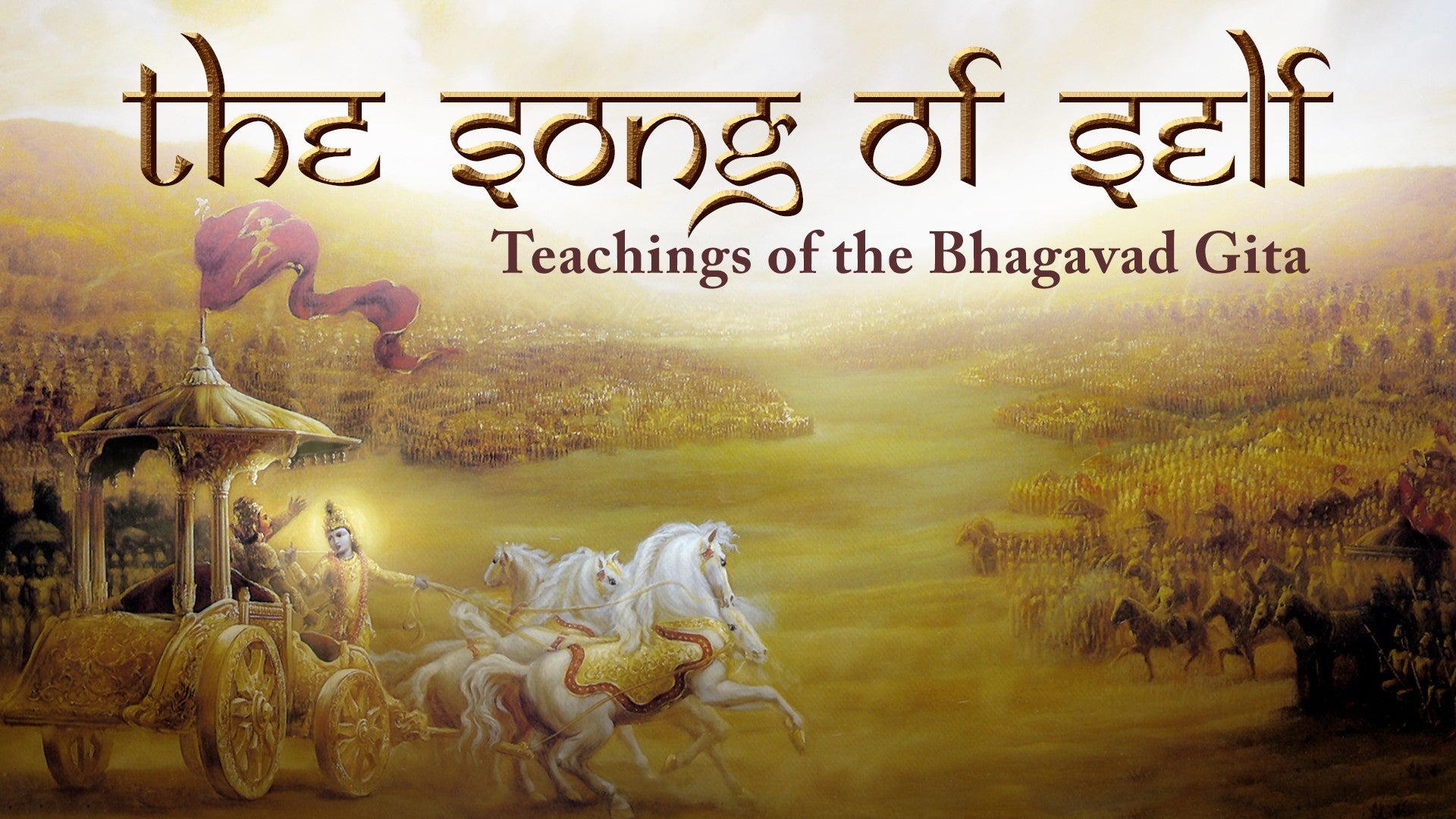Description
About This Video
Transcript
Read Full Transcript
So now, with the 23rd verse, Krishna tells a little bit more about the nature of the undying essence of the soul. And for this 23rd verse, I mentioned in the introduction that I would use my bottle as a teaching aid. And this is one of the verses where it's going to play a particular role. So I'll put it right here for now. And we're going to take 23 to 25 together.
So I'll just recite these three. So 23. Nainam chindanti shastrani nainam dahati pavakah nachainam krida yantya po nachoshyatimarutah hanyam chindanti shastrani nainam dahati pavakah nachayam krida yantya po nachoshyatimarutah nachanyaw asyam. Nainam chindanti shastrani nainam dahati pavakah nachainam krida yantya po nachainam krida á¹?Ä쳌cÄ쳌 inam klÄ«reyantÄ« apaḥ nÄ쳌Å?oÅ?atÄ« mÄ쳌rutaḥ What does it mean? So this, the soul, or the undying essence, or the unfathomable essence, it cannot be cut by weapons. Weapons cannot cut it. ṬpÄ쳌vakaḥ fire nÄ쳌dahati cannot burn it.
á¹?Ä쳌klÄ«reyantÄ« apaḥ water, or waters, cannot wet it. á¹?Ä쳌Å?oÅ?atÄ« mÄ쳌rutaḥ and wind cannot dry it. And in the 24th, he continued, he says, Ä쳌cÄ쳌d yoyam, this is uncuttable, uncleavable, you cannot split it in two, with weapons. Ä쳌yam Ä쳌klÄ«reyahÄ쳌, Ä쳌dÄ쳌hyahÄ쳌, Ä쳌Å?oÅ?ahÄ쳌, it cannot be burnt, it cannot be dried by the wind, it cannot be wet by the waters. á¹?ityÄ쳌, this is eternal, this is saravagadÄ쳌, it's omnipresent, stÄ쳌á¹?ahu, it's steady, it's always there.
Ä쳌cala, it's not moving, Ä쳌yam sanÄ쳌tanaḥ, this is everlasting. Now, why am I using this bottle? A few years ago, I used to have a plastic bottle when I was teaching, so sometimes, you know, I'd be travelling through an airport that seemed to be designed to try and take any money that was left in your pocket out as soon as you'd gone through the security, because after they've confiscated the water that you brought from home, they invite you to buy a new one in a plastic bottle, yeah? So I arrive somewhere and I've got my plastic bottle, and then I would reuse it, filling it. But maybe you've experienced this, if you keep a plastic bottle for a long time, eventually it starts to, the colour starts to change.
And one time I was there in class and I had a rather well-used plastic bottle, and a dear friend of mine called Anna, an Italian lady, she says, James, why do you have this almost worn-out bottle? You know, Krishna's just said, you know, when something's worn out, you replace it, you know? She says, you should do the upgrade. And she had one of these bottles, and I don't think I'll get in trouble for saying it, it's a Swiss-made one, you know, it's a Swiss brand, and it says, since 1908, so more than a hundred years, they've been making these very durable bottles. And so my friend Anna says, you travel a lot, they often sell them in the airport, why don't you buy one?
Then you wouldn't need to have a rotten old plastic one that's probably full of who knows what chemicals. And she said, okay, and I said to her, okay, I'll do the upgrade. And that was in 2011, and we're filming here today in 2015, so. Anna's wisdom has proved valid, it's much more durable than plastic, and it has served me as a teaching aid on countless occasions, including today. Because even though this is the Swiss-made, high-quality, well, you know, the desirable water bottle, if I had the right weapon, I could cut it in two, yes?
Even though it has this particular surface which stops the water kind of adhering to it, I could still wet it. And then if I put the, you know, I expose it to the wind, it would get dry. And if I put it in a hot enough fire, it would still get burnt. Is this true? So why am I using my bottle to talk about this?
This could be any object, any object. Anything in material reality with the right equipment, you can cut it in two. You can burn it, you can dry it, you can wet it. Now, Krishna says this, the soul, is undryable, unwettable, unburnable, and uncleavable. It cannot be cut in two.
So what's he really saying in these verses? This, the soul, is not like anything out there that is subject to cutting, wetting, drying, burning. In other words, it's not a material thing. It's subtler than that. So sometimes people say, why does Krishna have to go on for so many verses about the inviolable, undying, eternal soul?
So one of my friends, Radha, who I mentioned the other day, I was once in a class and somebody asked this question, and she was in the class too, and she says, well, have you got it yet? The idea being that we need reminding, that every time he says it, he says it in a slightly different way. And so he's just kind of encouraging us to be inquisitive, to be explorative, to be curious, to recognize that, yeah, this, this which allows us to experience the bottle, to prefer the long-lasting durable bottle to one that is just plastic and perhaps leaving chemical residue in the water, the consciousness that allows us to have this type of experience and any type of experience is quite different to anything that we experience with it. So this is what Krishna's really emphasizing here. This is not like that which is all around.
It's something subtler. And in the 25th, he emphasizes this a bit further. He says, avyakto yama chintyo yam, avikaryo yam uchchatiya. So, I am, this is said to be avyakto ha, which means it's kind of invisible. It's beyond perception.
It's beyond the manifest form. Achitya, it's beyond what you can even conceive. It's almost unimaginable. Avikaryo, and it cannot be made to decay. Tasmad evam viritva, enam na anosho chitamah tasi.
So, tasmad, therefore, once you understand that your essence, your soul is like this, that it is beyond what you can perceive, that it's beyond what you can conceive, and that it cannot be made to decay. What are you grieving about? What are you mourning for? No harm can come to that. Your essence is invidable, he says.
It's indestructible. And so he's kind of emphasizing. Remember, back at the 11th verse, Krishna told Arjuna, no reason to mourn. And so he's kind of reiterated that here, saying, your essence, Arjuna, nobody can touch it. So don't mourn.
The Song of Self: Bhagavad Gita: Chapter 2
Comments

You need to be a subscriber to post a comment.
Please Log In or Create an Account to start your free trial.








